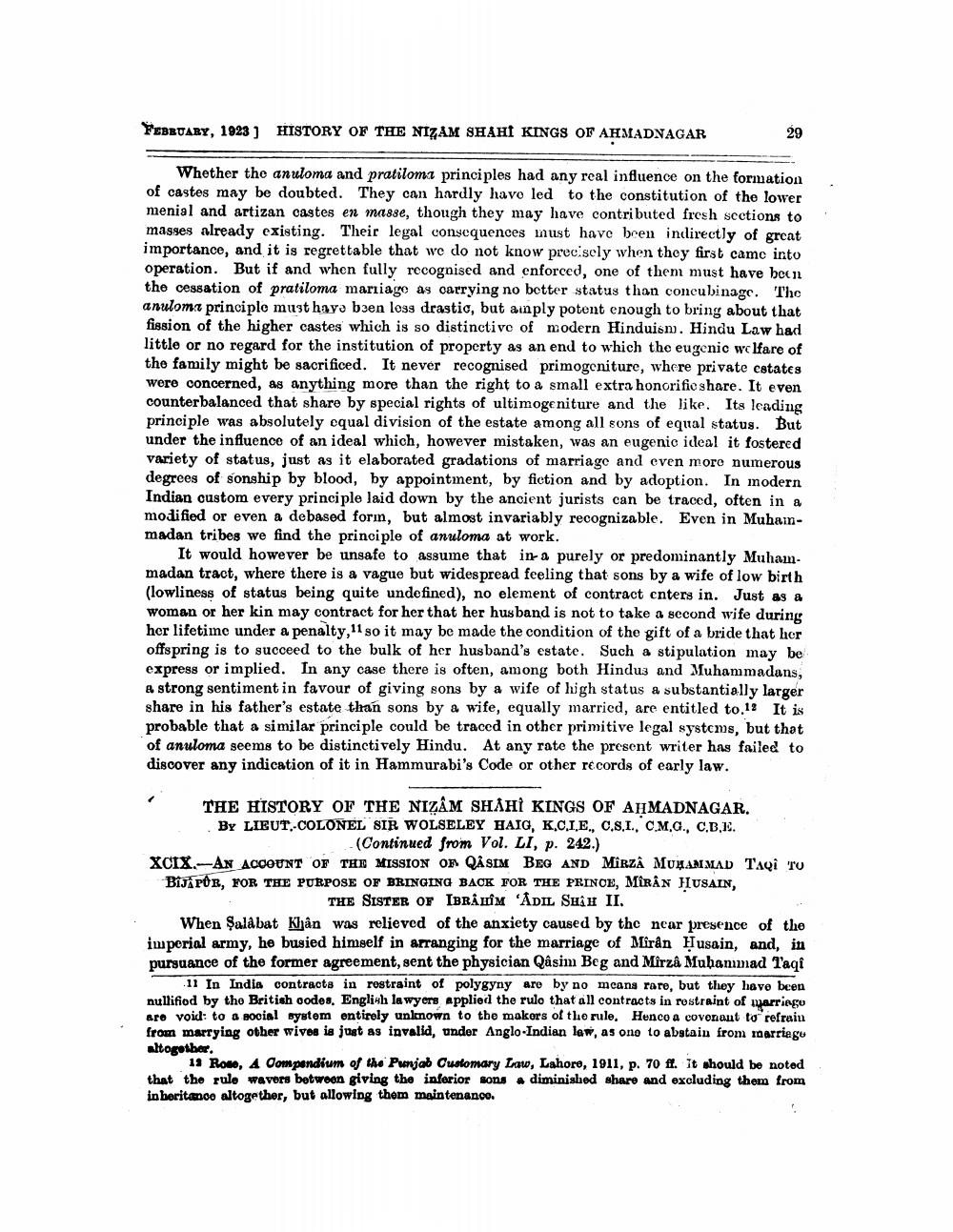________________
FEBRUARY, 1923] HISTORY OF THE NIZAM SHAHI KINGS OF AHMADNAGAR
Whether the anuloma and pratiloma principles had any real influence on the formation of castes may be doubted. They can hardly have led to the constitution of the lower menial and artizan castes en masse, though they may have contributed fresh sections to masses already existing. Their legal consequences must have been indirectly of great importance, and it is regrettable that we do not know precisely when they first came into operation. But if and when fully recognised and enforced, one of them must have been the cessation of pratiloma marriage as carrying no better status than concubinage. The anuloma principle must have been less drastic, but amply potent enough to bring about that fission of the higher castes which is so distinctive of modern Hinduism. Hindu Law had little or no regard for the institution of property as an end to which the eugenic welfare of the family might be sacrificed. It never recognised primogeniture, where private estates were concerned, as anything more than the right to a small extra honorific share. It even counterbalanced that share by special rights of ultimogeniture and the like. Its leading principle was absolutely equal division of the estate among all sons of equal status. But under the influence of an ideal which, however mistaken, was an eugenic ideal it fostered variety of status, just as it elaborated gradations of marriage and even more numerous degrees of sonship by blood, by appointment, by fiction and by adoption. In modern Indian custom every principle laid down by the ancient jurists can be traced, often in a modified or even a debased form, but almost invariably recognizable. Even in Muhammadan tribes we find the principle of anuloma at work.
It would however be unsafe to assume that in a purely or predominantly Muhammadan tract, where there is a vague but widespread feeling that sons by a wife of low birth (lowliness of status being quite undefined), no element of contract enters in. Just as a woman or her kin may contract for her that her husband is not to take a second wife during her lifetime under a penalty, 11 so it may be made the condition of the gift of a bride that her offspring is to succeed to the bulk of her husband's estate. Such a stipulation may be express or implied. In any case there is often, among both Hindus and Muhammadans, a strong sentiment in favour of giving sons by a wife of high status a substantially larger share in his father's estate than sons by a wife, equally married, are entitled to.12 It is probable that a similar principle could be traced in other primitive legal systems, but that of anuloma seems to be distinctively Hindu. At any rate the present writer has failed to discover any indication of it in Hammurabi's Code or other records of early law.
THE HISTORY OF THE NIZAM SHAHI KINGS OF AHMADNAGAR. By LIEUT, COLONEL SIR WOLSELEY HAIG, K.C.I.E., C.S.I., C.M.G., C.B.E. (Continued from Vol. LI, p. 242.)
29
XCIX.-AN ACCOUNT OF THE MISSION OF QASIM BEG AND MIRZA MUHAMMAD TAQI TO BIJAPUR, FOR THE PURPOSE OF BRINGING BACK FOR THE PRINCE, MIRAN HUSAIN,
THE SISTER OF IBRAHIM 'ADIL SHAH II.
When Salabat Khân was relieved of the anxiety caused by the near presence of the imperial army, he busied himself in arranging for the marriage of Miran Husain, and, in pursuance of the former agreement, sent the physician Qasim Beg and Mirza Muhammad Taqi
11 In India contracts in restraint of polygyny are by no means rare, but they have been nullified by the British codes. English lawyers applied the rule that all contracts in restraint of marriage are void: to a social system entirely unknown to the makers of the rule. Henco a covenant to refrain from marrying other wives is just as invalid, under Anglo-Indian law, as one to abstain from marriage altogether.
13 Rose, A Compendium of the Punjab Customary Law, Lahore, 1911, p. 70 ff. It should be noted that the rule wavers between giving the inferior sons a diminished share and excluding them from inheritance altogether, but allowing them maintenance.




